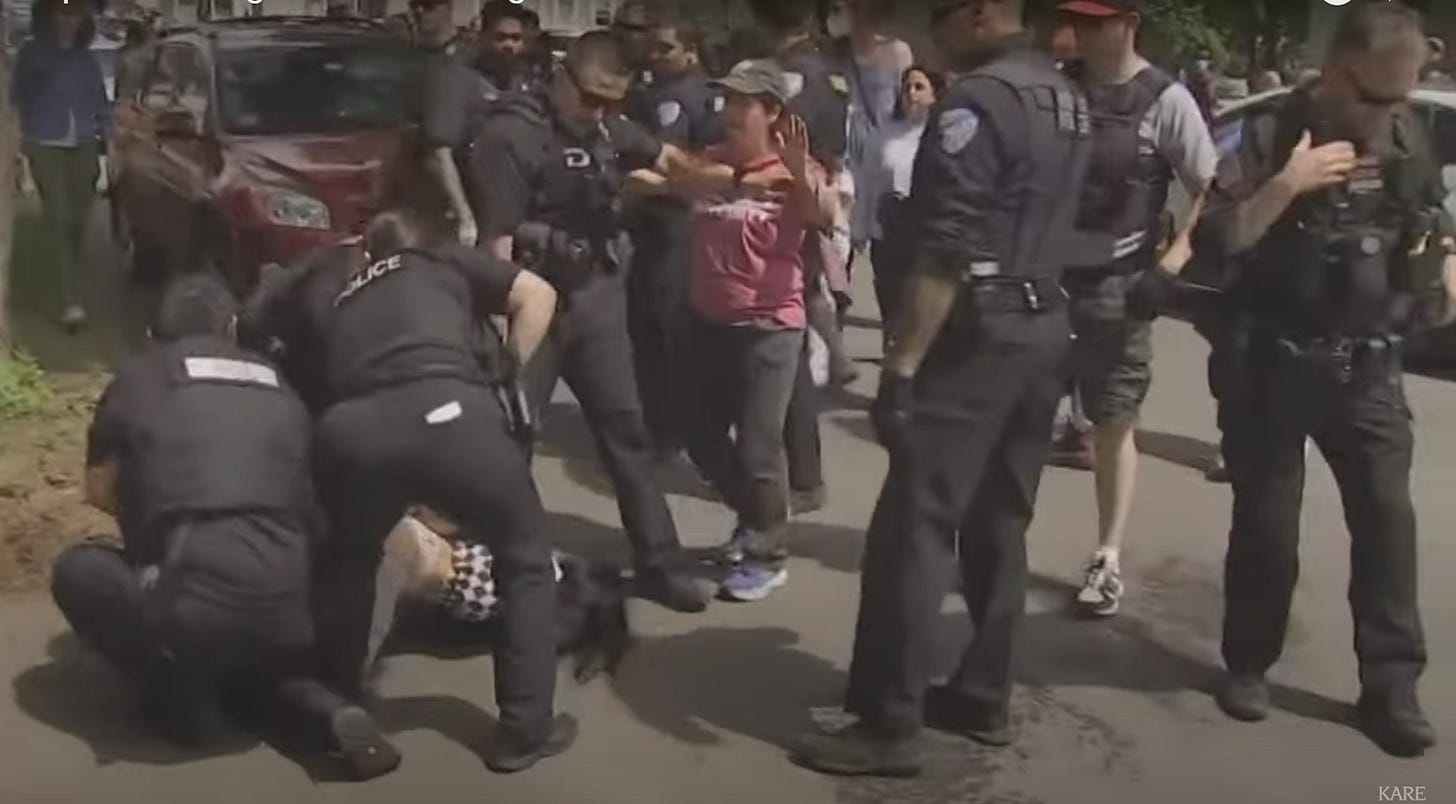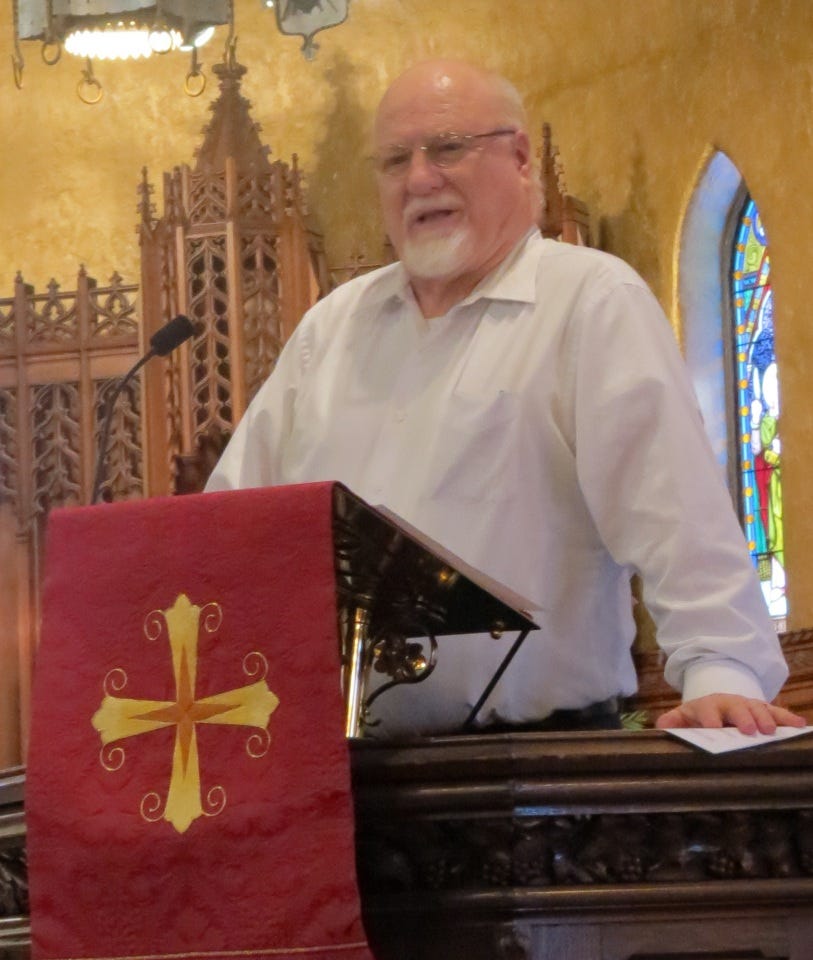The Pope, Peace, and Precarity
Also: Worcester CWer witnesses controversial ICE arrest, joins residents demanding answers; Gaza aid update; upcoming CW events; and Dorothy on motherhood.
Who Needs a Pope?
Well, while Renée is covering the papal conclave and the elevation of Pope Leo XIV for U.S. Catholic, I’ve been doing laundry and pulling weeds and editing words in exchange for cash—all the mundanity of day-to-day life. All of which came to a screeching halt when I received a text from my brother, camped out in St. Peter’s Square with his wife and their older kids: “We have a pope!”
At which point, general bedlam broke out: the TV went on in the living room, the radio went on in the kitchen, and everyone in the house gathered for an hour-long vigil to find out who had been chosen. (I married a Catholic theologian, so yeah—this is how things roll around here.)
As Renée has noted in her coverage, it seems that the new pope has a history and values that line up pretty well with Catholic Worker thought. On Saturday, in a dialogue with the College of Cardinals, the new pope shared his first reason for choosing the name Leo XIV:
“because Pope Leo XIII in his historic Encyclical Rerum Novarum addressed the social question in the context of the first great industrial revolution. In our own day, the Church offers to everyone the treasury of her social teaching in response to another industrial revolution and to developments in the field of artificial intelligence that pose new challenges for the defence of human dignity, justice and labour.”
Dorothy would have been pleased, probably, with his ascension to the chair of Peter—although members of the LGBTQ+ community and, as Renée reported for U.S. Catholic, survivors of sex abuse have concerns.
In any case, what has struck me the most about all the hype surrounding these events has been the sheer intensity of the coverage. From the BBC to NPR to the front pages of the New York Times and the Chicago Tribune, the sheer amount of coverage and its generally positive tone has puzzled me. The pope doesn’t wield economic or military or political power; yes, he “leads the world’s 1.4 billion Catholics,” as the news media constantly mention, but as Dorothy noted wryly, how many of those Catholics listen to what he has to say?
So, what gives? The last time I checked, the Catholic Church was persona non grata among cultural influencers. I mean, since when does the world need a pope?
I wonder—hesitantly—whether the level and intensity of interest doesn’t stem from a deep thirst for a goodness that transcends the pragmatic, practical, reductionistic values of modern life? Maybe the Roman pontiff matters to the wider culture just to the extent that he points toward the possibility of that transcendent goodness; and with it, the possibility of a world in which it is easier for people to be good.
If that is so, then it is not the pope that the world really wants, but the healing love and justice of Jesus Christ. And incarnating that in the world is the work of the whole body of Christ, not just the pope—all of us, in our everyday mundanity, choosing the good over the convenient and the practical. Choosing to love rather than give in to easy hate. Hard work, that; may God send us the help we need—and may some of that help come through the hands of the new pope.
—Jerry
Correction
In last week’s Roundtable, we listed the wrong dates for San Antonio Catholic Worker’s 40th anniversary celebration and Catholic Worker gathering. The correct dates are Thursday, Oct. 2, through Sunday, October 5, 2025. Details are forthcoming.
FEATURED
The Pope, Peace, and Precarity
Renée Roden, in Rome to cover the elevation of Pope Leo XIV for U.S. Catholic magazine, arrived there without a place to stay…a predicament that informed her experience of the general mood of celebration:
As I walked back to the Ukrainian College that night, I passed lines of tents circling the colonnade of St. Peter’s Square. I thought of the nice, quiet room and soft bed I was walking toward. I thought of the brief moment of panic I had felt in Newark Airport before boarding a plane without a plan set in place. I thought that was precarity? This is precarity. I could have slept in the square, surrounded by the Son of Man who had nowhere to lay his head. I considered what Francesco would have done.
Read her essay in Friday’s CW Reads.
You might also be interested in her coverage for U.S. Catholic: Will Pope Leo confront the church’s deepest wound? Also: First impressions of Leo XIV, the first American pontiff
Houston Catholic Worker: Why Not Peter Maurin Justice Gardens?
The Trump administration's canceling of $1B in funding for two USDA programs that connected local farms and ranches with food shelves and schools has left everyone connected to the programs scrambling. The families served by the Houston Catholic Worker are among those affected; Casa Juan Diego typically distributed fresh produce from the Houston Food Bank to more than one thousand families. “The impact is dramatic: fewer fruits and vegetables for the most vulnerable among us,” Kent Keith writes in an article for the Houston Catholic Worker’s upcoming summer issue. “But we are not without hope—or tools. One of the greatest examples from our country’s past offers us a way forward.”
Today, we invite our readers and neighbors to take part in a new movement: Peter Maurin Justice Gardens.
These Peter Maurin Justice Gardens are not only about growing vegetables—they are about growing solidarity. By planting a garden at your home, church, school, or community center—and donating even a portion of your harvest to Casa Juan Diego—you are helping to bridge the gap left by policy and bureaucracy.
You are saying, with your hands in the soil, “We will not let our neighbors go hungry.”
Read about how to get involved in Saturday’s issue of CW Reads.
Update on CW Efforts to Aid Gazans

As Israel escalates its incursion into Gaza, Hildegard House Catholic Worker (Duluth, Minnesota) is appealing for people to support Yusef, a Palestinian poet and activist living in Gaza. As you might recall, Garry Jones, Michael Hanish, and Kate Hennessy began direct support to Yusef last fall. Hildegard House and St. Isidore Catholic Worker Farm joined the effort shortly after, sending money, photos, and words of encouragement to Yusuf.
Yusef and his friends are alive but have been affected by the latest Israeli hostilities. Besides financial help, contact with the outside world offers much-needed emotional support. To find out how you can support Yusef, read Michele Naar-Obed’s update in Saturday’s CW Reads.
Separately, on Monday we reported on the plight of the Conscience, a humanitarian aid ship operated by the Freedom Flotilla Coalition. Shortly after midnight on May 2nd, the Conscience was attacked by drones. The attack left the ship disabled and caused minor injuries to four crew members.
Catholic Worker Cassandra Dixon was part of a group of about 30 aid workers participating in the mission of the Conscience; she was ashore with other aid workers when the attack took place. The Maltese government did not provide immediate aid to the burning ship, nor did it allow Freedom Flotilla volunteers to reach the ship. In response, Freedom Flotilla requested that people contact the Maltese embassy to demand that it fulfill its maritime obligations under international law.
For updates, see the Freedom Flotilla Instagram page. You can support Cassandra’s mission at her GoFundMe page.
Urban Catholic Workers Cultivate the Soil to Heal Souls
When people want examples of Peter Maurin’s “green revolution” being lived out in the Catholic Worker movement, rural Catholic Worker farms tend to get all the love and attention. But urban Catholic Workers have been tapping into Peter’s ideas, too, as an article by Jerry Windley-Daoust in the spring issue of Catholic Rural Life suggests. Spencer Hess of the John Paul II Catholic Worker Farm (Kansas City, Missouri) was one of the urban Catholic Workers interviewed for the story:
Ideally, Hess said, the John Paul II Catholic Worker Farm exists to do much more than practicing regenerative farming or distributing fresh organic food to the neighbors. Ideally, he said, it will challenge people to think more creatively—more hopefully, as Hennessy puts it—about the way we live. Why not, he asks, live more in harmony with God’s plan for the natural order?
The community wants to show “that these are not utopian romantic fever dreams,” Hess said. “This is how we can be living our lives if we would just really make the effort and the sacrifices necessary to do it.”
Read the full article in Thursday’s CW Reads or at CatholicWorker.org.
COMMUNITY NEWS & NEWSLETTERS
Jessica Reznicek Released from Solitary Confinement
Des Moines Catholic Worker Jessica Reznicek has been released from solitary confinement after spending three months in disciplinary segregation at FCI Waseca, according to a note from Frank Cordaro (Des Moines Catholic Worker). This marks her third stint in "the hole" during her eight-year sentence for sabotaging the Dakota Access Pipeline in 2016 and 2017.
When prison authorities offered to transfer Reznicek to a higher-security facility, she declined and rejoined the general prison population, where she is now adjusting to life in a new unit.
“She sounded great on the phone,” Cordaro wrote in an update to Catholic Worker communities. “It is so good to hear her voice and that she is okay.”
Reznicek’s prison counselor has suggested she could be eligible for transfer to a halfway house in Des Moines within two years. “At the moment, Jess sees herself returning to the DMCW,” Cordaro shared. “And that is Good News!”
Upon her release from solitary confinement, she immediately arranged for $1,000 in assistance to friends inside and outside prison. Contributions to her prison fund make this generosity possible, Cordaro said.
To support Jess’s work or write to her directly, send donations to the Des Moines Catholic Worker, PO Box 4551, Des Moines, IA 50305 (note: “Jess’s Prison Fund”). Letters can be sent to:
Jessica Reznicek #19293-030
FCI Waseca, PO Box 1731
Waseca, MN 56093
Des Moines CW Mourns Rev. Bob Cook
In other news from the Des Moines Catholic Worker, longtime friend Rev. Bob Cook passed away on April 30. A memorial service will be held on May 17 at St. Paul Presbyterian Church in Johnston, Iowa. He had suffered major setbacks following knee surgery, according to DMCW’s Frank Cordaro.
Cordaro suggests people pay tribute to Cook by donating to his charity, Legacy of Light, which provides solar electricity to families in El Salvador. You can donate by sending a check to Legacy of Light at 1317 8th Street, Des Moines, Iowa 50311 with the note “For Legacy of Light.”
Sacred Tent CW Gathers for Spring Service and Community
Earlier this month, volunteers gathered at Sacred Tent Catholic Worker (Clarendon Hills, Illinois) to pack backpacks for people in need, according to the community’s May newsletter. A community farming initiative and a meal train to support two guests were also planned for this month. For details, contact the community at community@sacredtent.org or visit its website.
St. Francis House Seeks Live-In Volunteer, Funds for Home Repairs
The St. Francis Catholic Worker in Chicago is seeking a live-in volunteer to join them for several months of hospitality work, the community wrote in a recent update. At the same time, the house is undertaking a series of long-overdue repairs that include rewiring outdated electrical systems, replacing windows, and repairing the porch. The largest investment is in renewing the kitchen, where volunteers prepare more than 300 meals each week. In total, the community hopes to raise at least $17,000 this season to cover immediate projects. To learn more or contribute, see the full message.
Dorothy Day Foundation Donates to 20 CW Communities
The Dorothy Day Foundation (DDF) reports that it has distributed $3,000 to 20 Catholic Worker communities in amounts ranging from $25 monthly recurring donations to $100 one-time gifts. The organization, founded and operated by Dorothy Day Tampa CW co-founder Michael Doyle, has been reaching out to Catholic Worker communities that have made public appeals for funds; it boosts those appeals to its supporters.
The foundation operates as a 501c3 tax-exempt organization. Most Catholic Worker communities eschew tax-exempt status, citing the opposition of CW co-founders Dorothy Day and Peter Maurin to government involvement or oversight of the works of mercy. However, at least thirty communities maintain tax-exempt status.
CW IN THE MEDIA
CWers Among Worcester Residents Demanding Answers after ICE Arrest

Worcester residents are demanding answers from city leaders following the chaotic arrest of a Brazilian woman and her daughter by masked Immigration and Customs Enforcement (ICE) officials on Thursday. Claire Schaeffer-Duffy of Sts. Francis & Therese Catholic Worker witnessed the arrest and was among the 200 or so activists attending a meeting with city officials on Friday.
The incident began when ICE agents arrived at the family’s home, according to numerous media reports. Within minutes, approximately two dozen neighbors had gathered, attempting to form a human barrier around the family. Residents demanded to see a warrant, but ICE agents reportedly stated they were not required to provide one. The situation escalated when officers from the Worcester Police Department arrived to support the ICE agents.
Numerous residents filmed the chaos that ensued. Video footage shows the Brazilian woman screaming as she is tackled by police and held to the ground. Her 16-year-old daughter was later arrested after she attempted to block the ICE vehicle’s departure.
On Friday, community members gathered at the YWCA to express their anger and demand answers from city officials. Many called attention to the lack of a warrant and the separation of the family.
Schaeffer-Duffy, who witnessed the scene, spoke to news station WCVB: “The father has already been taken, so the mother is now going to get taken and leave behind these two daughters, one of whom just had a baby? It was a moment of a lot of anguish.”
City Denies Plan for 'Dorothy Day Townhomes' on Former Catholic Worker Site
Developers are planning to build a set of five townhomes on the site of the former San Antonio Catholic Worker location. The proposed name of the townhomes? Dorothy Day Townhomes.
But the project hit a roadblock last week when the city’s Historic and Design Review Commission denied a request for conceptual approval. The proposed development by father-son team Paul and Patrick Vance faced opposition from the local neighborhood association, as well as concerns from commissioners about incomplete plans and zoning questions. You can read all about it in the San Antonio Report.
MARK YOUR CALENDAR
Catholic Workers Will Join KC PeaceWorks for Anti-Nuke Protest
Catholic Workers will join PeaceWorks Kansas City on Monday, May 19, to protest the ongoing production of nuclear weapons at the Kansas City National Security Campus (KCNSC), one of the nation’s primary suppliers of parts for the U.S. nuclear arsenal.
The protest will include a civil resistance action starting at 6 a.m., with participants blockading the main entrance to the plant at 14510 Botts Road during shift changes. A preparation session, “Back from the Brink,” will be held the day before at Waldo Library.
Brian Terrell of the Strangers and Guests Catholic Worker in Iowa emphasized the significance of the protest, pointing out that “just about everything mechanical or electronic about the B61-13 is going to be made at the KC plant.” He added, “The logic of speeding up production is to give the president more options dealing with the present global challenges.”
Mike Miles of Anathoth Catholic Worker in Wisconsin called out the broader implications of the plant’s work: “What the workers at NNSA do every day—including those at the KCNSC—leads to illegal activity.”
Organizers are encouraging public participation, noting that those who remain on the public right-of-way will not be subject to arrest.
Webinar on the Shared Vision of Dorothy Day and Pope Francis
The Dorothy Day Guild will host an online webinar, Dorothy and Pope Francis: A Shared Vision for Our World, on Tuesday, May 13, from 7:00 to 8:30 p.m. Eastern. The event will reflect on the legacy of Pope Francis—especially his love for the earth and the poor, his commitment to voluntary poverty, and his pursuit of peace—and how these Gospel-rooted priorities resonate with the life and witness of Servant of God Dorothy Day.
The panel will feature Robert Ellsberg, Dr. Margaret Pfeil, Deirdre Cornell, and Magdalena Muñoz Pizzulic, with introductions by Gus Fuller, a young Catholic Worker whose journey into the Church was shaped by the writings and example of both Dorothy and Pope Francis. The conversation will be moderated by Dr. Kevin Ahern, chair of the Dorothy Day Guild.
WORDS FROM THE ELDERS
“O, the Generations of Mothers”
by Dorothy Day, from On Pilgrimage
Susie has a good appetite and ploughs her way sturdily through a breakfast of wheat cereal, apple sauce and a full 8 oz. of milk. But Becky eats like a bird. A bit of whole wheat bread, a piece of apple, a handful of wheat when the chickens are fed, a piece of raw carrot, a bit of raw oats. She has a great liking for these things. T., when she was a baby, refused a bottle after she was weaned at 10 months, drank only a few swallows of milk, and made each meal a torment. Then when she had to be away from home at the hospital for a week with abscessed ears, she almost starved, since she would not take a bottle and no one had the patience to feed her. I can remember bringing her home from the hospital looking gaunt and starved, weeping over her all the way. Then she was so ravenous I had to get up in the middle of the night to make cereal for her. She had bronchitis that winter and I worried over her constantly. I remember one doctor telling me, “Throw away your thermometer. Babies are hard to kill.” He was a clinic doctor and saw many sicker than mine.
O the generations of mothers! Of women and babies! I have pictures of my mother’s mother and grandmother on the one hand, and myself and daughter and granddaughter. Six generations of us.
My mother used to nurse her baby sister as a little girl, and so had a taste of motherhood long before she had five of her own. That little sister died last year, and my mother four years ago. Charity Washburn, Anna Satterlee, Grace Day, Dorothy, Tamar, Rebecca, six generations living during wars, revolutions, earthquakes, hurricane, and more war.
My mother said as she was dying–“I have lived enough,” But up to a week or so before her death her appetite for life had not diminished. She loved life, passionately, intensely, wanted to live, and felt that life was full, was thrilling even at seventy-five.
Her last child was born when she was forty-five and of course I thought of her as old then. She was not well after that for a year or so, and every morning I used to get up with my brother at four thirty–change him, feed him and put him into a warm carriage beside the fireplace in the library to take another nap while I studied Virgil before getting breakfast. I was in my last year of the Robert Waller high school in Chicago and I loved Latin so much that I read the Ecloques besides the Aenead.
Our teacher, Dr. Matheson so inspired us with enthusiasm that he offered to teach Greek to any who wished to remain an additional period after school. A number of us did, and got through Xenophon and the New Testament. There are not many such teachers today.
I should not have studied half so well if I had not had that baby to get up with in the morning.
Read the entire essay at CatholicWorker.org.
About us. Roundtable is a publication of catholicworker.org that covers the Catholic Worker Movement.
Roundtable is independent of the New York Catholic Worker or The Catholic Worker newspaper. This week’s Roundtable was produced by Renée Roden and Jerry Windley-Daoust. Send inquiries to roundtable@catholicworker.org.
Subscription management. Add CW Reads, our long-read edition, by managing your subscription here. Need to unsubscribe? Use the link at the bottom of this email. Need to cancel your paid subscription? Find out how here. Gift subscriptions can be purchased here.
Paid subscriptions. Paid subscriptions are entirely optional; free subscribers receive all the benefits that paid subscribers receive. Paid subscriptions fund our work and cover operating expenses. If you would like to stop seeing Substack’s prompt to upgrade to a paid subscription, please email roundtable@catholicworker.org.








“because Pope Leo XIII in his historic Encyclical Rerum Novarum addressed the social question in the context of the first great industrial revolution. In our own day, the Church offers to everyone the treasury of her social teaching in response to another industrial revolution and to developments in the field of artificial intelligence that pose new challenges for the defence of human dignity, justice and labour.”
Here is my suggestion for a revolution in Catholic education:
A request to St. Michael to help Pope Leo XIV see the needs of the poor for better conditions in the field of Catholic education similar to Pope Leo XIII’s letter advocating better working conditions for the poor.
“A preferential option for the poor” should be maintained in our Catholic Schools. If we find that we cannot afford to keep our schools open to the poor, the Church should be ready to use its resources for something else which can be kept open to the poor. We cannot allow our Church to become a church primarily for the middle-class and rich while throwing a bone to the poor. The priority should be given to the poor even if we have to let the middle-class and rich fend for themselves.
Practically speaking, the Catholic Schools must give up general education in those countries where the State is providing it. The resources of the Church could then be focused on “Confraternity of Christian Doctrine” and other programs which can be kept open to the poor. Remember, the Church managed without Catholic Schools for centuries. It can get along without them today. The essential factor from the Christian point of view is to cultivate enough Faith to act in the Gospel Tradition, namely, THE POOR GET PRIORITY. The rich and middle-class are welcome too. But the poor come first.